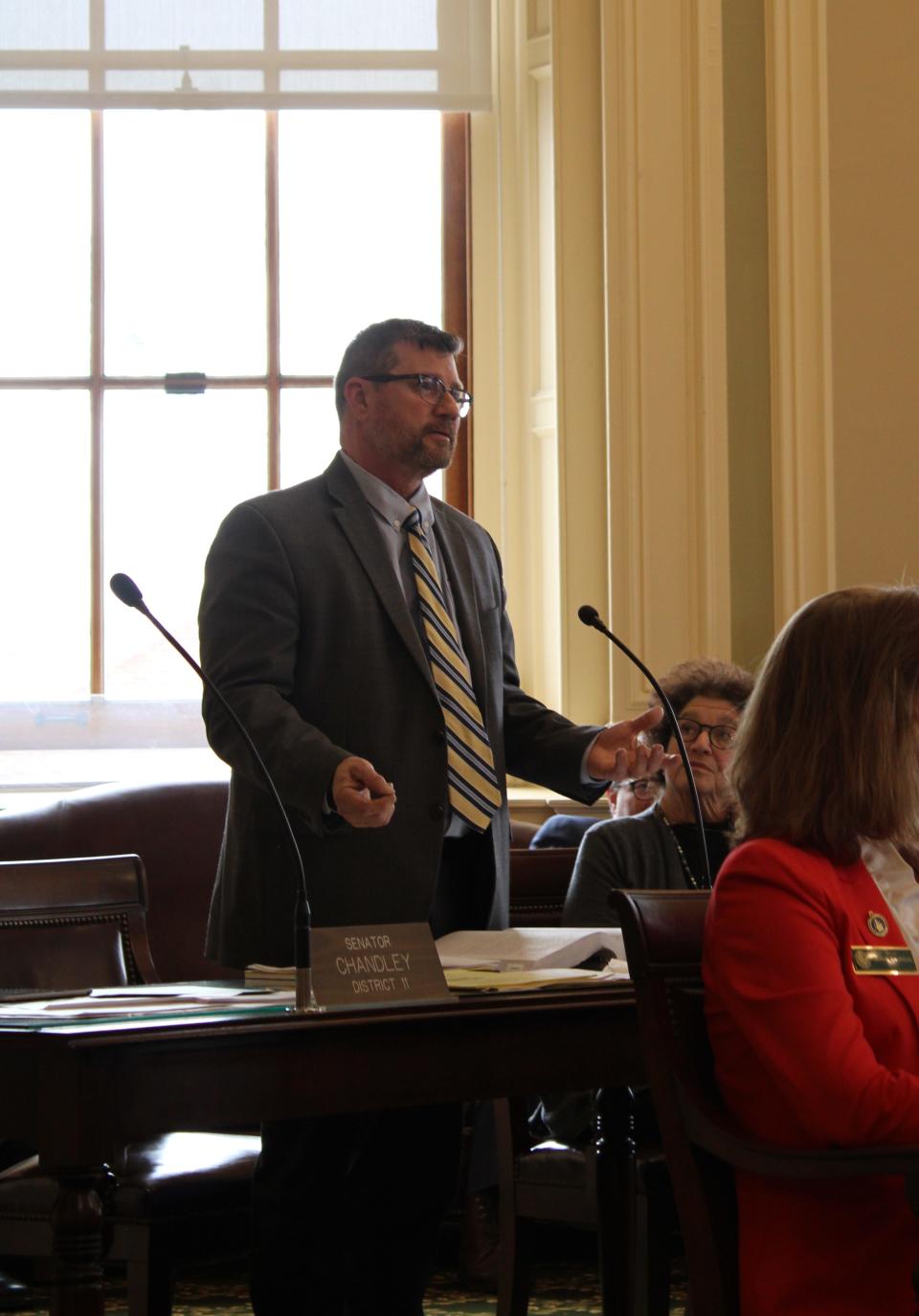NH Senate puts end to medical aid in dying bill for 2024, despite tearful testimony
- Oops!Something went wrong.Please try again later.
CONCORD — The New Hampshire Senate sent a bill to allow medical aid in dying for terminally ill people to interim study on Thursday with a bipartisan vote, effectively killing the legislation for this year.
House Bill 1283, also known as the End of Life Options Act, has sparked emotional testimony throughout the legislative session. Supporters of the bill have shared stories of their own family members going through traumatic deaths, while opponents have raised fears about a “slippery slope” where the law is applied to those without a terminal disease.
The discussion on the Senate floor followed similar lines of debate. In the end, the bill was referred to interim study 17-7. But it followed the bipartisan theme it’s seen all year: four Democrats voted for interim study and one Republican voted against it.
Bipartisan opposition and support for medical aid in dying on NH Senate floor

Sen. Keith Murphy, R-Manchester, was the sole Republican to support the medical aid in dying bill. His aunt, he said, took her life with a shotgun after learning she had terminal cancer.
“No one second guessed her decision. We respected it, we understood it. Not all of us would’ve made that decision. But we respected her right to make the decision she made. Now had this law been in effect at that time, in that place,” he said, “we would have an opportunity to say goodbye. We could have had an open casket. In short, she would not have had to reach for a shotgun to end her life because there would have been a better option available.”
Sen. Rebecca Perkins Kwoka, D-Portsmouth, spoke about her mother’s recent passing to an aggressive late stage cancer, saying that it is “not a compassionate way to go.”
Sen. Ruth Ward, R-Stoddard, said she could not support the bill, saying “medical care is not assisted suicide.” As a retired nurse practitioner, she said terminal illness doesn’t have to be painful and she is for keeping the person comfortable rather than “inject them with something.”
Sen. Kevin Avard, R-Nashua, connected the pro-Palestinian protests on college campuses to his fear of the “slippery slope.”
“They're tomorrow's leaders. They're the lawyers, the doctors, the teachers, the president, they’re the next legislatures,” Avard said. “This bill opens that up just enough for it to be expanded in the next legislature, for Alzheimer's, for mental illness.”
Sen. Regina Birdsell, R-Hampstead, said some of her opposition was due to the bill containing no residency requirement, which she said would “make our state a magnet for a much more tragic purpose.” She also said that this legislation sends the wrong message to young people in New Hampshire.
“We should not be normalizing suicide in New Hampshire and we must protect our vulnerable communities from abuse and exploitation,” Birdsell said.
Four Democrats, Sen. Shannon Chandley, D-Amherst, Sen. Lou D’Allesandro, D-Manchester, Sen. Cindy Rosenwald, D-Nashua, and Sen. Donna Soucy, D-Manchester, voted for the interim study motion. They did not speak about their votes on the Senate floor.
Medical aid in dying issue likely to return
This year saw the most success a medical aid in dying bill has had in New Hampshire.
While it has been brought to the legislature in past years, it never before passed the House, which it did in March through a bipartisan vote.
“Don’t get me wrong, there was bipartisan opposition too but there was definitely bipartisan support,” said Rep. Bob Lynn, R-Windham, one of the co-sponsors of the bill. Lynn was optimistic before the Senate vote, but he said “it’s difficult to overturn a committee recommendation.” The bill had received a recommendation of interim study by the Senate Health and Human Services Committee in early May, which had been its first negative vote of the 2024 session.
Now it has been effectively killed in the Senate, but the issue is likely to return.
Perkins Kwoka, tearing up on the Senate floor when relaying the story of her mother’s passing, said even if the members of the Senate aren’t ready to consider legalizing medical aid in dying yet, they should think about it in the future.
“It’s a conversation we should continue,” Perkins Kwoka said. “We owe it to our residents to give them that degree of grace in their lives in their choice system.”
Before the House vote in March, supporters of the bill outside the Statehouse said even if it failed, they would be back. Bill sponsor Rep. Marjorie Smith, D-Durham, echoed their sentiment.
“It's not going away,” said Smith. “I think that they will find that there are a lot of people who want to contribute to the discussion and analysis in interim study, and who knows? A better bill might come out of it.”
This article originally appeared on Portsmouth Herald: NH Senate puts end to medical aid in dying bill for 2024

